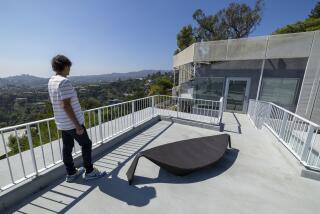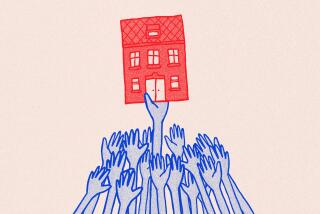Sarajevo Apt--Open and Airy, Needs Little TLC
- Share via
SARAJEVO, Bosnia-Herzegovina — The term “fixer-upper” takes on a whole new meaning in the Sarajevo real estate market.
Pay no attention to the missing doors and the holes left by last summer’s mortars, one prospective landlady says reassuringly. You want glass in your windows? asks another.
Rentals among the ruins: Peace has triggered a boom in the Bosnian capital’s housing market, sending prices soaring and owners scrambling to offer up just about anything (it seems) with walls.
Scarcely 10 months ago, as war raged, the few intrepid souls interested in renting a house or apartment in Sarajevo were journalists and the occasional civilian U.N. worker. Bargains, needless to say, were plentiful, even if amenities (electricity, running water) were not.
Today, with the war over and NATO in charge, Sarajevo has been flooded with hundreds, maybe thousands, of newly assigned diplomats, World Bank officials, bureaucrats, nongovernmental agency employees and other foreign civilians. Rents have doubled, and a cottage industry of real estate brokers--a rarity in prewar communist Yugoslavia--is flourishing.
I found myself thrust into this world of nouveau capitalism when the owners of the apartment I had been renting for the last year decided to return to Sarajevo. They had been living in Holland and, like many Bosnians, wanted to come home to test the peace. Like many journalists assigned to cover the former Yugoslavia, I live on a semi-permanent basis in Sarajevo, where my apartment doubles as an office.
Housing in Sarajevo is complicated by the fact that many refugees occupied vacant apartments during the war; furthermore, the government deliberately settled many of its supporters in the homes of people who left and is now refusing to restore properties to their rightful owners.
So the first thing an aspiring renter must know is whether the person offering a flat for rent has the legal authority to do so. Many Bosnians don’t exactly own their places but were granted title by their employers; renting out such a home would jeopardize their hold on it.
To get around that, one prospective landlord asked me to sign a lease saying I was renting only a room (for the equivalent of $1,500); another woman figured she could resolve the problem by continuing to live in the apartment even after I moved in. She’d take up only a room or so, she assured me, and, besides, she’d do the cooking and cleaning.
Another owner, a tall businessman in an expensive Italian suit, showed me a fourth-floor walk-up with potential. A large apartment with high ceilings in the Austro-Hungarian style, the place had been thoroughly trashed. Clearly, many refugees, or perhaps an army unit, had been occupying the rooms, and the eviction had been ugly. Piles of trash, old clothing and torn magazines littered the floors; the disgruntled “departees” had ripped out the commode, sinks and pieces of hardwood parquet.
“Just needs a little paint,” the owner said, evading repeatedly my questions about who had lived there. “Ready in two weeks.”
Some owners see the rental market as a way to make a quick buck; others are simply desperate. They depleted their savings during the war, when there were no jobs and no salaries but an expensive black market to provide basic foods and supplies. They are willing to move into often cramped quarters with relatives to rent out their homes. Most are savvy enough to spiff the place up a bit first, removing the charity plastic that covers most of Sarajevo’s bombed-out windows, replacing panes, plastering over bullet holes and patching gashed roofs.
The ranks of prospective renters, meanwhile, began to swell after the signing of a peace accord last December ushered an estimated 60,000 North Atlantic Treaty Organization troops into Bosnia and made it relatively safe for peacemakers and business people.
By springtime, the sight of foreigners with suits, ties and briefcases became as common as the scores of sidewalk cafes mushrooming through downtown Sarajevo, and they all needed places to live.
Peace also meant that some neighborhoods that sat dangerously close to front-line positions or were sitting-duck targets are no longer off-limits. This has expanded the potential market onto the picturesque hills that sweep up from central Sarajevo.
One American company involved in reconstruction projects, for example, burst into town and, real estate agents say, snatched up three houses in a single day--houses in the devastated Grbavica neighborhood once famous for its Bosnian Serb snipers.
We are forced to seek out apartments, in part, because hotel space is still pretty scarce. There are only two hotels of any substantial size in Sarajevo; both are controlled by the government and are quite choosy about who is let in. One, the infamous Holiday Inn, seems to favor high-spending NATO and U.S. Embassy officers; the other reserves a floor or so for CNN and recently was purported to be housing actor Woody Harrelson (in town to shoot a movie) and the ambassador of Qatar.
At the Holiday Inn, whose shattered yellow facade looked onto Serb firing positions during the war, the rooms go for $200 or more a night. And that is still without hot water, according to an American ambassador who stayed there recently.
More to Read
Inside the business of entertainment
The Wide Shot brings you news, analysis and insights on everything from streaming wars to production — and what it all means for the future.
You may occasionally receive promotional content from the Los Angeles Times.











